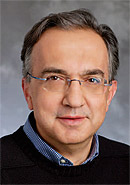(ISO: Geneva) -- The February 2012 issue of ISO Focus+, the magazine of the International Organization for Standardization (ISO), will be showing up on people’s desks soon. In particular, it will make an appearance at the Fully Networked Car workshop, which is held annually at the Geneva International Motor Show in Switzerland, in March. This year will be the seventh workshop, which focuses on the car of the future and the intelligent transport system (ITS) needed to support it.
|
ADVERTISEMENT |
In an ISO Focus+ exclusive, high-level executives from the world’s leading carmakers such as Audi, Bentley Motors, and Kia Motors reveal their companies’ perspectives on the benefits of standards implementation and share their expectations for today and tomorrow. Here’s a sampling:
 |
Sergio Marchionne, CEO of Fiat and Chrysler Group: “We do need standards; the world needs standards. Standards help an enterprise manage business-critical issues, such as quality, environmental performance, and safety.” |
…
Add new comment